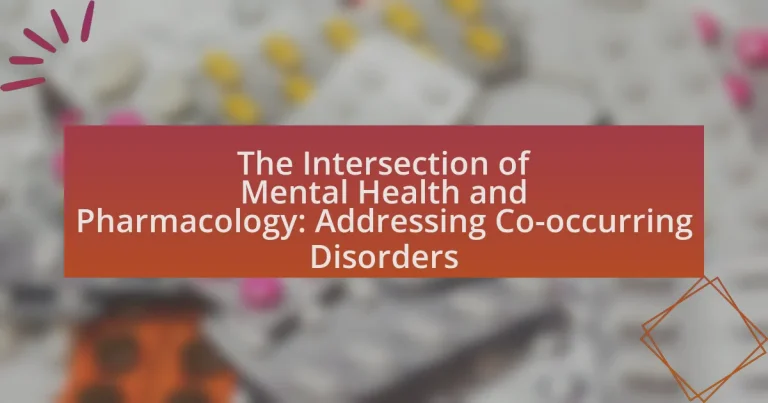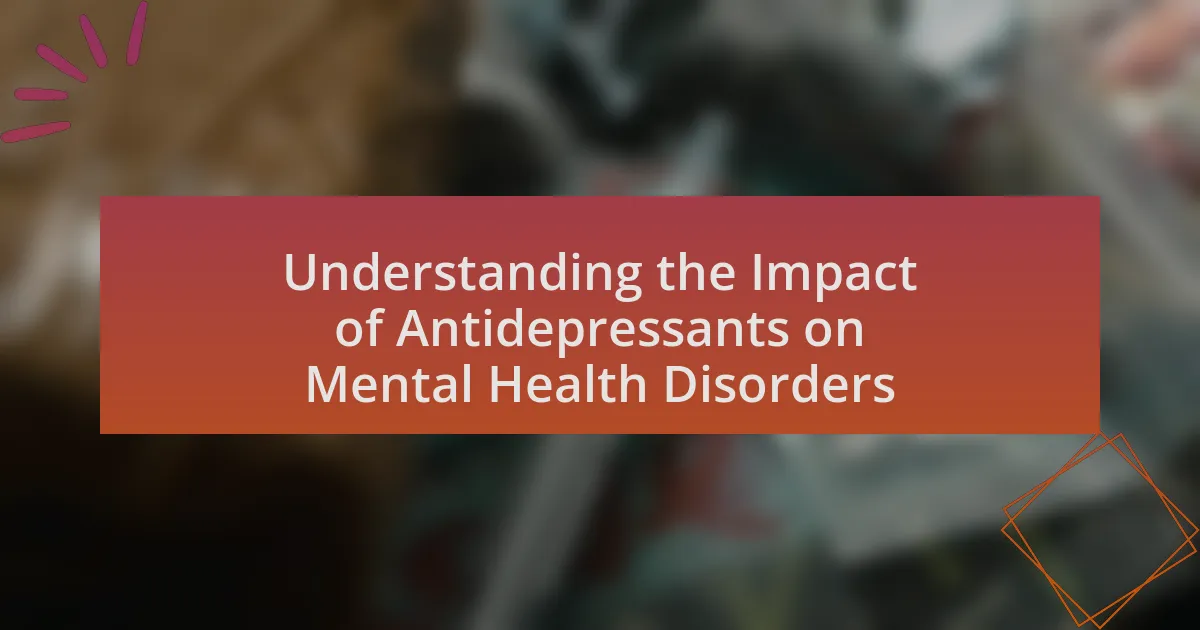The article focuses on the intersection of mental health and pharmacology, particularly in the context of co-occurring disorders, which involve the simultaneous presence of mental health and substance use disorders. It highlights the importance of pharmacological interventions, such as antidepressants and antipsychotics, in managing symptoms and improving patient outcomes. The article discusses the interaction between mental health and pharmacology, the significance of understanding co-occurring disorders, and the role of integrated treatment approaches that combine medication with psychotherapy. Additionally, it outlines best practices for treatment and resources available for individuals facing these challenges, emphasizing the need for a holistic approach to care.
What is the Intersection of Mental Health and Pharmacology?
The intersection of mental health and pharmacology involves the use of medications to treat mental health disorders, which can significantly improve patient outcomes. Pharmacological interventions, such as antidepressants, antipsychotics, and anxiolytics, are essential in managing symptoms of conditions like depression, schizophrenia, and anxiety disorders. Research indicates that approximately 20% of adults in the U.S. experience mental illness, and pharmacological treatments are often a critical component of comprehensive care, enhancing the effectiveness of psychotherapy and other therapeutic approaches.
How do mental health and pharmacology interact?
Mental health and pharmacology interact through the use of medications to treat mental health disorders, influencing both symptoms and overall well-being. Pharmacological treatments, such as antidepressants, antipsychotics, and anxiolytics, are designed to alter brain chemistry, thereby alleviating symptoms of conditions like depression, anxiety, and schizophrenia. Research indicates that approximately 70% of individuals with mental health disorders benefit from pharmacological interventions, demonstrating their effectiveness in managing symptoms and improving quality of life. Furthermore, the interaction between mental health and pharmacology is critical in addressing co-occurring disorders, as effective medication management can lead to better treatment outcomes for individuals facing both mental health and substance use issues.
What are the key concepts in mental health?
Key concepts in mental health include emotional well-being, psychological resilience, and social functioning. Emotional well-being refers to the ability to manage emotions and cope with stress, while psychological resilience is the capacity to recover from difficulties. Social functioning encompasses the ability to form and maintain relationships, which is crucial for overall mental health. Research indicates that these concepts are interconnected; for instance, individuals with strong emotional well-being often exhibit higher levels of resilience and better social functioning, as supported by studies such as the World Health Organization’s report on mental health promotion.
What role does pharmacology play in treating mental health disorders?
Pharmacology plays a crucial role in treating mental health disorders by providing medications that can alleviate symptoms and improve functioning. These medications, such as antidepressants, antipsychotics, and anxiolytics, target specific neurotransmitter systems in the brain, helping to restore chemical balance. For instance, selective serotonin reuptake inhibitors (SSRIs) are commonly prescribed for depression and anxiety, demonstrating efficacy in clinical trials, such as those published in the Journal of Clinical Psychiatry, which show that SSRIs can significantly reduce symptoms in a substantial percentage of patients. Thus, pharmacology is essential in the management of mental health disorders, offering evidence-based treatment options that enhance the quality of life for individuals affected by these conditions.
Why is understanding co-occurring disorders important?
Understanding co-occurring disorders is important because it allows for comprehensive treatment strategies that address both mental health and substance use issues simultaneously. Research indicates that individuals with co-occurring disorders often experience more severe symptoms and poorer outcomes if only one disorder is treated, highlighting the necessity for integrated care approaches. For instance, the Substance Abuse and Mental Health Services Administration (SAMHSA) reports that nearly 8.9 million adults in the U.S. have co-occurring mental health and substance use disorders, emphasizing the prevalence and need for effective intervention strategies.
What are co-occurring disorders?
Co-occurring disorders are the simultaneous presence of a mental health disorder and a substance use disorder in an individual. This dual diagnosis complicates treatment, as each disorder can exacerbate the other, leading to more severe symptoms and challenges in recovery. Research indicates that approximately 7.9 million adults in the United States experience co-occurring disorders, highlighting the prevalence and significance of addressing both conditions concurrently for effective treatment outcomes.
How do co-occurring disorders complicate treatment?
Co-occurring disorders complicate treatment by creating a complex interplay between mental health and substance use issues, which can hinder effective intervention. Individuals with both mental health disorders and substance use disorders often experience overlapping symptoms, making it difficult for healthcare providers to determine which condition is primary and should be treated first. This dual diagnosis can lead to increased treatment resistance, as symptoms of one disorder may exacerbate the other, resulting in a cycle of relapse and worsening mental health. Research indicates that approximately 50% of individuals with severe mental disorders also have substance use disorders, highlighting the prevalence and impact of co-occurring conditions on treatment outcomes.
What are the common co-occurring disorders?
Common co-occurring disorders include substance use disorders, anxiety disorders, and mood disorders such as depression. Research indicates that individuals with mental health conditions often experience substance use disorders, with studies showing that approximately 50% of individuals with severe mental disorders also have substance use issues. Additionally, anxiety disorders frequently co-occur with depression, affecting around 60% of those diagnosed with depression. These statistics highlight the prevalence and interrelation of these disorders, emphasizing the need for integrated treatment approaches.
Which mental health disorders frequently co-occur with substance use disorders?
Mental health disorders that frequently co-occur with substance use disorders include depression, anxiety disorders, post-traumatic stress disorder (PTSD), and bipolar disorder. Research indicates that individuals with substance use disorders often experience these mental health issues, with studies showing that approximately 50% of individuals with a substance use disorder also have a co-occurring mental health disorder. For instance, the National Institute on Drug Abuse reports that about 30% of individuals with an anxiety disorder also have a substance use disorder, highlighting the significant overlap between these conditions.
What are the symptoms of these co-occurring disorders?
Co-occurring disorders, which involve the simultaneous presence of mental health issues and substance use disorders, exhibit a range of symptoms. Common symptoms include mood swings, anxiety, depression, and changes in behavior, alongside substance cravings, withdrawal symptoms, and impaired functioning in daily life. Research indicates that individuals with co-occurring disorders often experience heightened severity of symptoms compared to those with a single disorder, leading to increased challenges in treatment and recovery.
How do these disorders impact each other?
Co-occurring mental health disorders significantly impact each other by exacerbating symptoms and complicating treatment. For instance, individuals with depression may experience increased anxiety, leading to a cycle where each disorder worsens the other. Research indicates that approximately 50% of individuals with a substance use disorder also have a co-occurring mental health disorder, which can hinder recovery efforts and increase the risk of relapse. This interrelation necessitates integrated treatment approaches that address both disorders simultaneously to improve overall outcomes.
What are the implications of untreated co-occurring disorders?
Untreated co-occurring disorders can lead to severe negative outcomes, including increased severity of both mental health and substance use disorders. Individuals may experience heightened symptoms, reduced quality of life, and greater difficulty in maintaining relationships and employment. Research indicates that approximately 50% of individuals with severe mental disorders also have substance use disorders, which complicates treatment and recovery efforts. Furthermore, untreated co-occurring disorders are associated with higher rates of hospitalization, homelessness, and incarceration, as well as increased risk of suicide. These implications underscore the necessity for integrated treatment approaches that address both mental health and substance use issues simultaneously.
How does untreated mental health affect substance use?
Untreated mental health issues significantly increase the likelihood of substance use. Individuals with conditions such as depression, anxiety, or PTSD may turn to drugs or alcohol as a form of self-medication to alleviate their symptoms. Research indicates that approximately 50% of individuals with a mental health disorder also have a substance use disorder, highlighting the strong correlation between the two. This co-occurrence can exacerbate both mental health and substance use issues, leading to a cycle that is difficult to break without appropriate treatment.
What are the long-term consequences of ignoring co-occurring disorders?
Ignoring co-occurring disorders can lead to severe long-term consequences, including worsening mental health symptoms, increased risk of substance abuse, and higher rates of hospitalization. Individuals with untreated co-occurring disorders often experience a decline in overall functioning, which can result in difficulties in maintaining employment, relationships, and daily activities. Research indicates that approximately 50% of individuals with severe mental disorders also have substance use disorders, and vice versa, highlighting the interconnected nature of these conditions. Failure to address both disorders simultaneously can exacerbate symptoms, leading to a cycle of deterioration that complicates treatment and recovery efforts.
How is pharmacology used to address co-occurring disorders?
Pharmacology is used to address co-occurring disorders by providing targeted medications that treat both mental health conditions and substance use disorders simultaneously. This dual approach is essential because individuals with co-occurring disorders often experience complex interactions between their mental health symptoms and substance use, which can exacerbate each other. For instance, medications such as selective serotonin reuptake inhibitors (SSRIs) can alleviate symptoms of depression while also reducing cravings for substances like alcohol. Research indicates that integrated treatment models, which include pharmacological interventions alongside psychotherapy, lead to better outcomes for patients with co-occurring disorders, as evidenced by studies showing improved retention in treatment and reduced relapse rates.
What types of medications are commonly prescribed for co-occurring disorders?
Medications commonly prescribed for co-occurring disorders include antidepressants, antipsychotics, mood stabilizers, and anxiolytics. Antidepressants, such as selective serotonin reuptake inhibitors (SSRIs), are often used to treat depression and anxiety symptoms that may accompany substance use disorders. Antipsychotics, like risperidone or aripiprazole, can help manage symptoms of psychosis or severe mood disturbances. Mood stabilizers, such as lithium or lamotrigine, are effective for individuals with bipolar disorder and co-occurring substance use issues. Anxiolytics, including benzodiazepines, may be prescribed for short-term relief of anxiety symptoms, although their use is carefully monitored due to potential for dependence. These medications are selected based on the specific mental health conditions and substance use patterns present in the individual, ensuring a tailored approach to treatment.
How do these medications work in the brain?
Medications for mental health conditions primarily work in the brain by altering neurotransmitter activity, which influences mood, cognition, and behavior. For instance, antidepressants like selective serotonin reuptake inhibitors (SSRIs) increase serotonin levels in the synaptic cleft, enhancing mood and emotional regulation. Similarly, antipsychotics modulate dopamine pathways to reduce symptoms of psychosis. Research indicates that these pharmacological interventions can lead to neurochemical changes that improve overall mental health outcomes, as evidenced by studies showing significant symptom reduction in patients with co-occurring disorders when treated with appropriate medications.
What are the potential side effects of these medications?
The potential side effects of medications used in treating co-occurring mental health disorders can include a range of physical and psychological symptoms. Common side effects may involve nausea, dizziness, weight gain, fatigue, and changes in mood or behavior. For instance, antidepressants can lead to sexual dysfunction and increased anxiety in some patients, while antipsychotics may cause sedation and metabolic syndrome. These side effects are documented in clinical studies, such as those published in the Journal of Clinical Psychiatry, which highlight the importance of monitoring patients for adverse reactions during treatment.
How can pharmacological treatments be integrated with therapy?
Pharmacological treatments can be integrated with therapy by using medications to manage symptoms while therapy addresses underlying issues. This combination allows for a comprehensive approach to mental health, where medications can stabilize mood or reduce anxiety, enabling patients to engage more effectively in therapeutic processes. Research indicates that integrated treatment models, such as those combining cognitive-behavioral therapy with antidepressants, can lead to improved outcomes for individuals with co-occurring disorders, as evidenced by studies showing enhanced symptom relief and better overall functioning.
What are the benefits of combining medication with psychotherapy?
Combining medication with psychotherapy enhances treatment outcomes for individuals with mental health disorders. This integrated approach addresses both biological and psychological aspects of mental health, leading to improved symptom management and overall functioning. Research indicates that patients receiving both treatments experience greater reductions in symptoms compared to those receiving either intervention alone. For instance, a study published in the Journal of Clinical Psychiatry found that individuals with depression who engaged in both medication and cognitive-behavioral therapy showed a 50% greater improvement in depressive symptoms than those treated with medication alone. This synergy not only alleviates symptoms more effectively but also equips individuals with coping strategies, fostering long-term recovery and resilience.
How can healthcare providers ensure a holistic approach to treatment?
Healthcare providers can ensure a holistic approach to treatment by integrating physical, mental, and social health assessments into patient care. This comprehensive strategy involves evaluating not only the medical conditions but also the psychological and social factors that influence a patient’s overall well-being. Research indicates that addressing co-occurring disorders, such as mental health issues alongside physical ailments, leads to better patient outcomes. For instance, a study published in the Journal of Substance Abuse Treatment found that integrated treatment for individuals with both substance use and mental health disorders significantly improved recovery rates. By employing interdisciplinary teams and personalized care plans, healthcare providers can effectively address the multifaceted needs of patients, ensuring a holistic treatment approach.
What best practices should be followed in treating co-occurring disorders?
The best practices for treating co-occurring disorders include integrated treatment approaches that address both mental health and substance use disorders simultaneously. Research indicates that integrated treatment improves outcomes by providing coordinated care tailored to the individual’s needs, which is essential given that approximately 50% of individuals with severe mental disorders also have substance use disorders (Substance Abuse and Mental Health Services Administration, 2020).
Additionally, employing evidence-based therapies such as cognitive-behavioral therapy (CBT) and motivational interviewing has been shown to be effective in managing symptoms and promoting recovery. A study published in the Journal of Substance Abuse Treatment found that individuals receiving integrated treatment had significantly better retention in treatment and lower rates of substance use compared to those receiving sequential treatment (Drake et al., 2001).
Furthermore, ongoing assessment and adjustment of treatment plans are crucial to address the evolving needs of individuals with co-occurring disorders. This dynamic approach ensures that interventions remain relevant and effective, ultimately leading to improved recovery outcomes.
How can patients advocate for their treatment needs?
Patients can advocate for their treatment needs by actively communicating their symptoms, preferences, and concerns to healthcare providers. This involves preparing for appointments by documenting specific issues, researching treatment options, and asking questions about medications and therapies. Studies show that patients who engage in shared decision-making with their providers report higher satisfaction and better health outcomes, highlighting the importance of patient involvement in their care.
What resources are available for individuals with co-occurring disorders?
Individuals with co-occurring disorders can access a variety of resources, including integrated treatment programs, support groups, and specialized therapy services. Integrated treatment programs combine mental health and substance use disorder services, allowing for a comprehensive approach to care. Support groups, such as those offered by the National Alliance on Mental Illness (NAMI) and Alcoholics Anonymous (AA), provide peer support and shared experiences. Specialized therapy services, including cognitive-behavioral therapy (CBT) and dialectical behavior therapy (DBT), are effective in addressing the complexities of co-occurring disorders. Research indicates that integrated treatment approaches significantly improve outcomes for individuals facing both mental health and substance use challenges.





